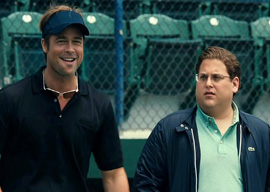
September 28, 2011

Brad Pitt and Jonah Hill
I complain frequently about insufficiently script-doctored movies such as Contagion. In contrast, Moneyball had become notorious as a looming Waterworld of screenwriting, with a half-dozen writers taking a hack at it. Steve Zaillian (Schindler’s List) and Aaron Sorkin (The Social Network) wound up with credits on a composite screenplay that should become a model for getting across esoteric concepts. One trick is redundancy with variation: Say the same thing over and over in entertainingly different ways.
Moneyball opened with a successful $20-million weekend, although the demographics were unsurprisingly skewed toward the frequent-flyer class. The $14.50 showings in Sherman Oaks sold out, while the $9.50 screening in Van Nuys was wide-open.
Smart middle-aged white guys really like baseball statistics. Sabermetrics provides men with a sheltered playpen in which to study nature and nurture with little risk of being called sexist or racist. Not surprisingly, the prime beneficiaries of Moneyball‘s focus on unglamorous skills such as not swinging tended to be high-body-fat white ballplayers who looked more like golfers than cornerbacks.
The movie concentrates on four overlooked players: the glamorous but aged African-American ex-slugger David Justice and three obscure white guys (Scott Hatteberg, Chad Bradford, and Jeremy Giambi). The A’s two top hitters, league MVP Miguel Tejada and Eric Chavez, are ignored, except when Beane rags on these Latins for swinging at bad pitches. (Historically, Latins tended to wheedle fewer walks, although that gap has narrowed.)
Michael Fassbender has had a good year (Jane Eyre and X-Men: First Class), but at this nascent stage of the awards season, Pitt is mostly competing with himself for Best Actor. I’d vote for his tough-dad act in The Tree of Life, although his Billy Beane deserves a degree-of-difficulty bonus for saying “on-base percentage” while spitting tobacco juice.
Bill James, the stats sage reverently referenced throughout Moneyball, pointed out that most ballplayers peak before they become fully famous. That’s true for actors, too, making Pitt’s career year in 2011, two decades after he became a star in Thelma & Louise, doubly impressive.
Compared to more driven stars such as Tom Cruise and Will Smith, Pitt’s career has been indolent, unassuming, and adventurous in equal measures. In my first movie review (The Mexican in 2001), I grumped that Pitt should figure out what he wants to be when he grows up. Perhaps he was merely waiting to grow up. As he’s grown less boyish and more weather-beaten, he’s only gotten better.
Finally, as much as I admire Bill James’s revolution intellectually, his emphasis on homers and walks helped to exacerbate trends toward steroids (a word unmentioned in Moneyball) and protracted games. (The average number of pitches per game has gone up by 11 since Oakland’s José Canseco, “the Typhoid Mary of steroids,” broke out in 1988.) Sure, stealing bases was dumb, but it was fun. In contrast, watching some lumbering chemical freak walk on ten pitches—then stand on first until the next PED abuser also walked—made for torpid viewing.
As Hobbes might have said, Bill James helped make baseball games intelligent, inelegant, and long.